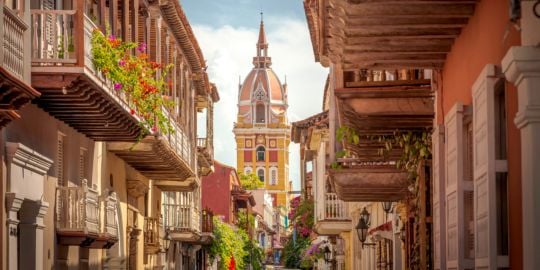My wife (Colombian) and I (USA) purchased a 'finca' near Pereira in Colombia last year. She has dual citizenship and I do not (again, USA).
Both our names are on the property. I'm not sure what she did, but she says she declared 50%....her half. I don't think this is correct...I don't have to declare any of the purchase in USA. I will if we collect rent, or other income, from it.
Anyone have experience with this? On what we need to do with the property declaration in Colombia? We make about $35us rent monthly on it, so we do declare that in both Colombia and USA.
I just don't know how she only declares 50%. Any ideas?
Colombia Property Declaration
mtbe wrote:Both our names are on the property....she says she declared 50%....her half. I don't think this is correct...
If two people co-own an income-producing property equally, Common Sense tells you that each receives 50 percent of the income and is responsible for 50 percent of any taxes due in relevant jurisdiction(s).
Since you haven't presented any cogent argument to the contrary, a reasonable person would say your wife would be correct to have declared 50 percent of the income.
I haven't perused this particular IRS document, but perhaps you would want to: IRS report 527, Residential Rental Property. It's free and readily available at irs.gov
Given that your "finca" income (at 50 percent, it's $17.50 per month) is low, you can probably deduct away your income. "Allowable expenses are the same as for U.S. property...advertising, repairs...insurance, depreciation (over 40 years for foreign property) and other expenses," according to US Abroad Taxes, an Expat tax advisory company.
Why not call the IRS about any tricky issues, or about the 50 percent. Find a toll-free number at irs.gov ... You might call or email the IRS more than once, as I'm guessing it's even-money that the second "guy" will tell you something different from the first. Follow the advice that makes sense. Keep a record of who told you what in case you're ever questioned or audited.
cccmedia, local property owner in Quito, Ecuador
mtbe wrote:My wife (Colombian) and I (USA) purchased a 'finca' near Pereira in Colombia last year. She has dual citizenship and I do not....Both our names are on the property.
While it's not practical, and probably not necessary, to hire professional help for the small about of income being generated, selling the "finca" down-the-road will be different.
So save all receipts.
Just from the three sentences excerpted at the top of this post, it's clear that you'll need a tax professional's guidance when reporting the sale for the tax year when it occurs.
US Abroad Taxes is just one of numerous firms whose specialty is Expat taxes, including sale of property where two countries may have jurisdiction.
cccmedia in Quito
Colombia has a wealth tax, if you are so lucky to have any. Your wife is correct to report her wealth on her Colombian tax return. Her wealth includes 50% of jointly owned property. If you are resident in Colombia for 183 days or more in 2014 you too are subject to the same rules she is subject to, and you are required to report your world wide wealth and income to Colombia. It may or may not result in Colombian tax.
It's done in the notaria documents, which is basically your title to the property. Because there is not tax treaty between the US and Colombia, your wife must pay income tax on the income produced by the property. As I understand it, if she did not declare that she has 50% ownership, as opposed to joint tenant (can't remember the Spanish term for joint tenant), she would have to pay taxes on all the rent receipts but, with 50% ownership, she is only liable for taxes on 50% of the receipts.
There are, however, community property laws here so, the only reason I can think of for such an arrangement would be for tax purposes. Of course, it does prevent you from selling the property, without her signature and the reverse is true. I have a friend, who would have benefited by such an arrangement, when he was divorced. Ironically, he's a CPA.
Lots of Colombian CPAs (Contador Público) don't know Colombian tax law. Lots of USA CPAs don't know US tax law either.









